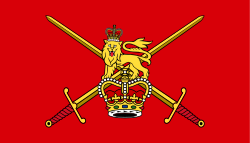History
A Quartermaster-General first appears in English Army records in 1667; as a permanently established post it dates from 1686. [1]
Defence Equipment and Support
In January 2007, following the formation of Defence Equipment and Support, Lieutenant General Richard Applegate assumed the appointment of 'Chief of Materiel (Land), Defence Equipment and Support Organisation'; [5] the following month, he was appointed to the office of Quartermaster General. [6] His two immediate successors were also gazetted as holding 'the appointment of Chief of Materiel (Land) Defence Equipment and Support and the office of Quartermaster General', [7] but when Paul Jaques was appointed in 2016 it was simply as 'Chief of Materiel (Land) Defence Equipment and Support'. [8] (The Ministry of Defence organisation charts have not used the term "Quartermaster-General" since 2011.) [9] [10] [11]
This page is based on this
Wikipedia article Text is available under the
CC BY-SA 4.0 license; additional terms may apply.
Images, videos and audio are available under their respective licenses.
